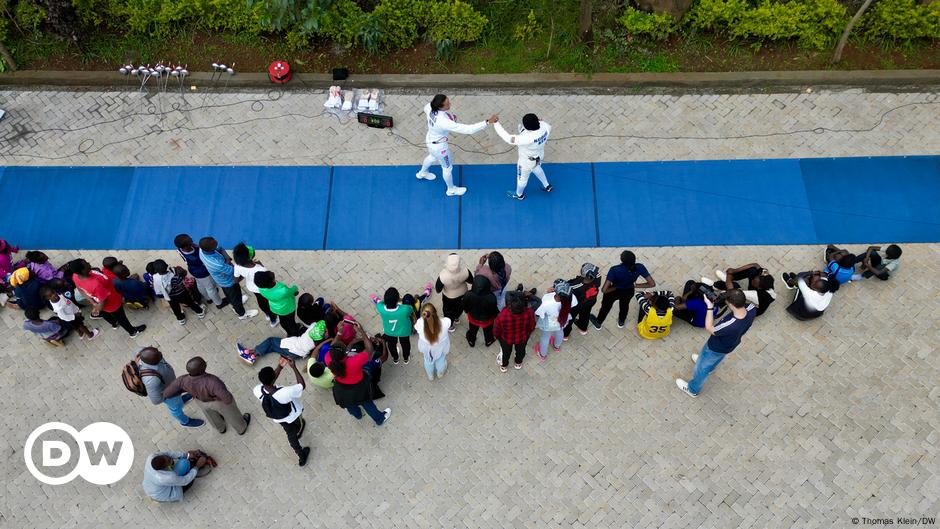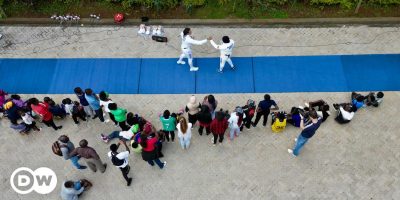On a small sports field on the outskirts of the Kenyan capital Nairobi, almost 60 young people take it in turns to cheer on Alexandra Ndolo and Ashley Ngoiri. The two fencers face off, demonstrating to the girls and boys a sport that is largely unknown in Kenya.
“When so many children shout loudly and cheer us on, it gives me a lot of energy and motivates me to bring my sport closer to the people, of course,” Ndolo told DW.
For Ngoiri, who only started fencing seven years ago, the support is also impressive. “As a fencer, this was the first time I had experienced something like this,” the 25-year-old told DW, admitting with a laugh: “It also distracted me a little.”
Fencing is for everyone
The two fencers are on a mission to establish fencing in Kenya. This is why they have been traveling across Nairobi for the past few days. Ndolo and Ngoiri want to dispel one particular prejudice, namely that fencing is a purely elitist sport.
“We have been in initiatives with children from the slums. We went to Kibera [slum area in Nairobi], but also to a country club, a very prestigious place,” Ndolo explained. “I want to bring fencing to everyone, regardless of how much money they have.”
Because, as Ndolo emphasizes again and again, fencing is for everyone. “I want to demystify fencing. I believe that the sport can also grow in Kenya.”
Ndolo makes Olympic history
Ndolo has a Polish mother and a Kenyan father. She was born in Germany and grew up in Bayreuth, Bavaria. The fencer has been engaged in the sport in her father’s native country for many years. Among other things, she is a co-founder of the Kenyan Fencing Federation, which has officially been part of the World Fencing Association since 2019. The 38-year-old is one of the best epee fencers in the world. At the 2022 World Championships in Cairo, she secured the runner-up world title for Germany – her career highlight for the time being.
Afterwards, she announced a change of federation and has been competing for Kenya ever since. In doing so, Ndolo “entered the unknown”, taking a financial and sporting risk. To this day, she has to finance and organize herself, as she has not yet received any money from the Kenyan federation. This was different in Germany, where she received funding from the association.
The 77 Percent – Sports Special
Despite many hurdles, Ndolo prevailed, and was crowned African champion last year. She also managed to take part in the Olympic Games in Paris, making her the first Kenyan Olympic fencer in history.
“The fact that we were allowed to fence in the Grand Palais still gives me goosebumps,” recalls the Olympian. And she adds with big eyes: “Seeing the Kenyan flag in the arena alongside all the other qualified countries was great.”
Ndolo wants to experience that again and has therefore set herself a high sporting goal: “I want to take part in the next Olympic Games [2028 in Los Angeles],” she says. “Once wasn’t enough for me.”
Ngoiri: ‘My mother thought I wanted to rob people’
Ndolo is a role model for many Kenyan children and young people, but also for 25-year-old Ngoiri.
“Alex is the most important person in my life,” says Ngoiri without hesitation. “She has opened many doors for me and brought me into contact with many people.”
The young fencer comes from Huruma, a slum outside Nairobi. In 2017, she took part in free fencing training at a fencing school. She was immediately fascinated and enthusiastic about the sport, which until then she had only seen in Jackie Chan films. Her family was skeptical at first, though.
“Since I use a kind of sword, my mother thought that I would use it to rob people to get their money,” Ngoiri said, laughing out loud as she recalled the story. She adds that her family has now understood what fencing is.
Ngoiri: ‘He hit me with my mask’
Fencing has changed Ngoiri’s life forever. In 2021, thanks to a fencing scholarship, she trained to become a coach in South Africa. She is now Kenya’s first female fencing coach. She can now earn money from the sport and has also become more self-confident, which has also helped her in her private life.
“I had a very toxic relationship with a man,” she said. “One blow after another, a black eye here. At some point, he also broke my weapon [her epee] and hit me with my mask,” Ngoiri recalls.
Sport distracted Ngoiri from the terrible situation at home and gave her strength. Eventually, she left her violent partner and is now standing on her own two feet.
Domestic violence, especially against women, is not uncommon in Kenya. The ‘Africa Data Hub’ network documented around 500 femicides in Kenya between 2016 and 2023. Unofficially, the number is likely to be significantly higher. In 75% of cases, the perpetrators came from the victim’s immediate environment. Just a few weeks ago, a woman in Ngoiri’s circle of acquaintances drowned herself in a well because of her boyfriend, she reported.
Fencing should help women
However, the story of ‘Coach Ashley’, as she is known by many, shows what is possible. This is another reason why Ndolo and Ngoiri want to continue to promote the development of fencing in Kenya.
“Fencing or sport in general teaches you so many lessons in life,” said Ndolo. “Perseverance, believing in yourself, dealing with setbacks and dealing with challenges.”
To keep awareness of fencing high, Ndolo will continue to travel to Kenya in the future. Working with children gives her a lot of energy, and it’s clear her mission to give people in Kenya the chance of a better life through fencing will continue.
“I believe I can achieve something in Kenya and make an impact,” said the Olympian. “I want to leave something behind for the country and enable children to fence – regardless of their parents’ financial situation.”
This article was adapted from German.















